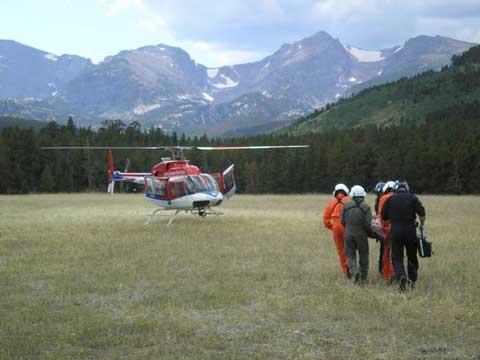Some high-tech equipment and old-fashioned stamina were both put to good use when a 73-year-old visitor suffered a heart attack in the backcountry at Rocky Mountain National Park. How the park bookstores played a role in the outcome might surprise you.
If you've ever shopped in a bookstore located in a park's visitor center or similar facility, perhaps you didn't realize your purchase might help save a life. A dramatic incident earlier this week at Rocky Mountain demonstrates how that can be the case.
Those stores are operated by non-profit cooperating associations, and they donate a portion of their revenue to the park(s) they serve; the donations pay for a wide variety of projects and items that could not be funded by the park's operating budget.
The Rocky Mountain Nature Association is the cooperating association at Rocky Mountain National Park. Among the items they've donated to the park: Automated External Defibrillators (AEDs), which can be used by trained personnel responding to a cardiac arrest.
An AED proved to be invaluable this past Monday. According to a park report,
At 11:15 a.m. on August 10, park dispatch received a call from a family member of a seventy-three-year-old man who was suffering from a possible heart attack on the Flattop Mountain Trail in the Bear Lake area of Rocky Mountain National Park. He had briefly lost consciousness. Although he had no known previous heart conditions, he was exhibiting signs of a heart attack.
The four-mile plus hike on the Flattop Mountain Trail is described on the park's website as "strenuous;" the trail gains 2,849 feet en route to a summit elevation of 12,324 feet.
The patient was roughly two miles, at an elevation gain of 1,400 feet (10,875 feet), from the trailhead. A hasty team of two rangers reached the trailhead at 11:44 a.m. and were on scene with the patient in less than thirty minutes, at 12:13 p.m.
Here's a little perspective for that response: If you're working out on a treadmill at your local health club, you'd have to walk at a very brisk pace of about four miles per hour to cover two miles in 30 minutes. Even if you set your treadmill at a steep incline to correspond to the elevation gain on that trail, I suspect your workout doesn't take place two miles above sea level!
The rangers' stamina would soon pay off.
The two rangers brought an Automated External Defibrillator (AED) and provided immediate care, including providing additional oxygen. A nine-person park litter team reached the patient at 1:06 p.m. [to transport him back to the trailhead.]
At 1:13 p.m. the patient went into cardiac arrest.
CPR was initiated and when the patient displayed a shockable rhythm, the AED was activated and the patient’s pulse was restored. The patient soon regained consciousness. A paramedic from Estes Park Medical Center arrived on scene shortly thereafter.
The patient was packaged in a wheeled litter and the team began bringing him down the trail at 1:26 p.m. He reached the trailhead at 2:00 p.m. and was placed in an Estes Park Medical Center ambulance which transported him to a landing zone at Glacier Basin Campground. At 2:26 p.m. North Colorado Med Evac flew the patient to Medical Center of the Rockies.
Mark Magnuson, the park's Chief Ranger, noted,
“I’m proud of the incredible response and teamwork from our staff and our partners from Estes Park Medical Center and the North Colorado Med Evac flight crew. This was truly a lifesaving rescue, and particularly impressive, considering it occurred 2 miles from the nearest trailhead parking lot.
Most of the AEDs in Rocky Mountain National Park have been donated by the park’s friends’ group, Rocky Mountain Nature Association. We extend our best wishes to the patient for a full recovery.”


 Support Essential Coverage of Essential Places
Support Essential Coverage of Essential Places







Comments
Just awesome response to a near fatal incident at Flat Mountain. It shows the peak physical conditioning these rangers were in and there top notch medical skills that saved this mans life. Kudos to the whole emergency response team and there dedicated staff...a job well done! Good luck to the patient!
Thanks for highlighting this event and especially detailing the role of the Rocky Mountain Nature Association and the philanthrophy that helped save this man's life. It is very rare to hear about the work of "quiet conservationists" like friends groups or cooperating associations or donors who help support our public lands. The numerous donors who helped purchase this equipment for just such an emergency should be very proud of this accomplishment.